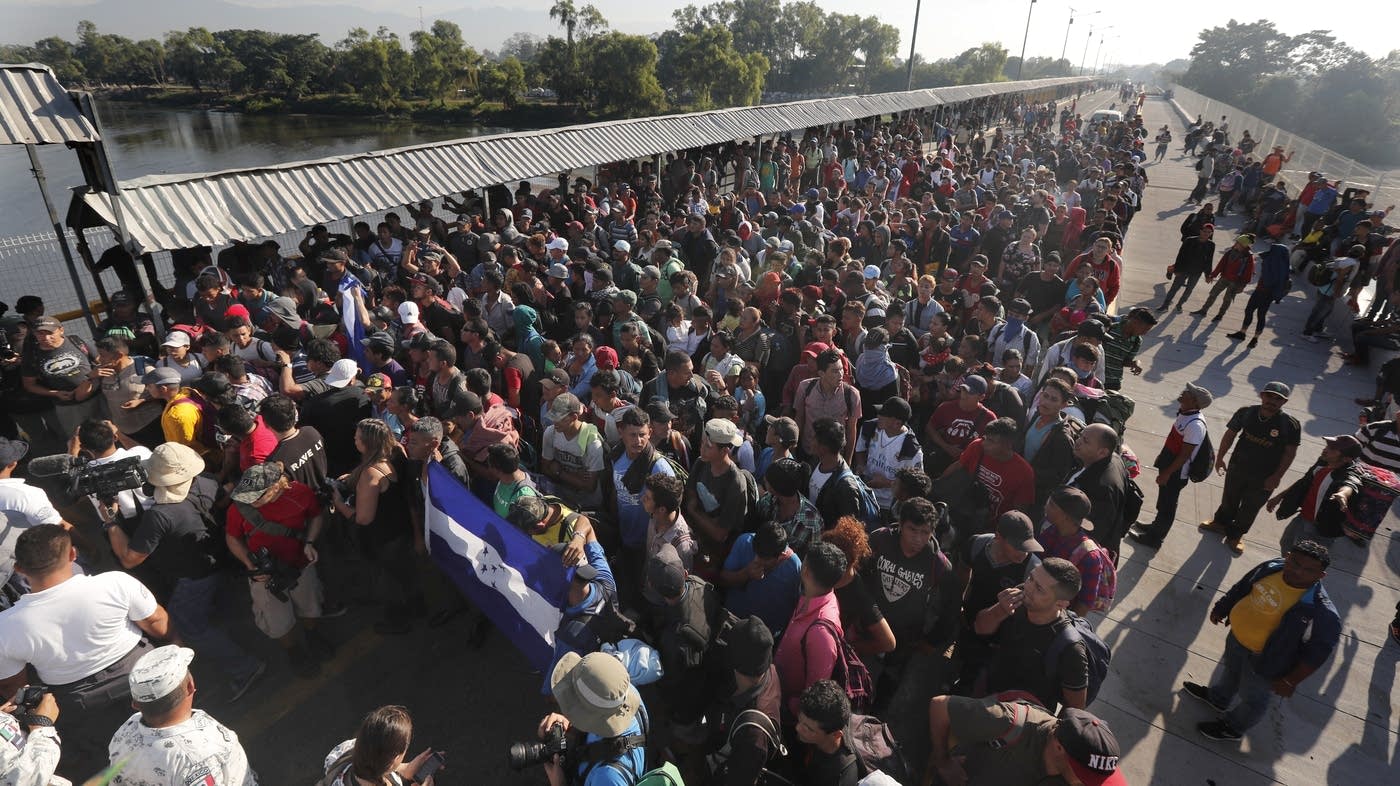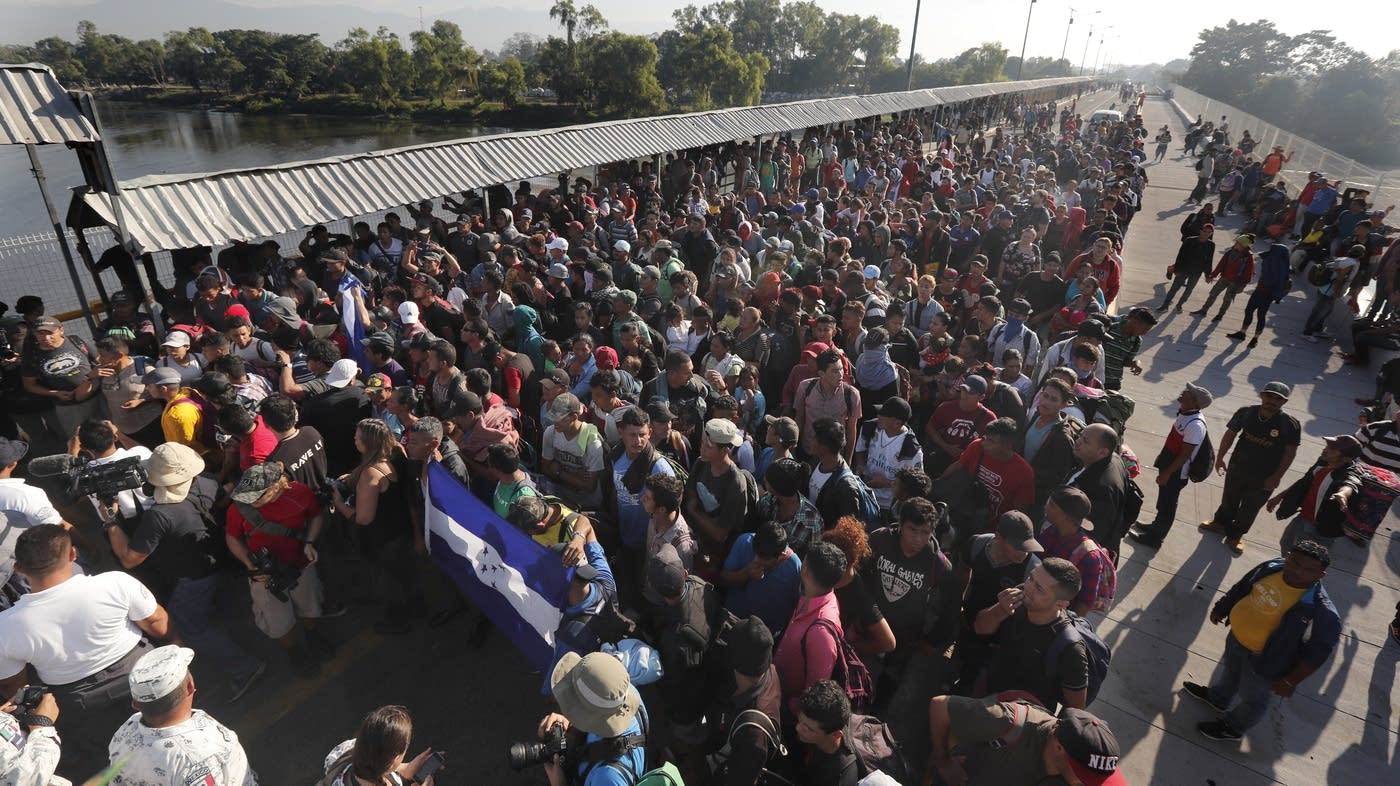Cracks in the American Mosaic
I brought the contradictions up with Geiorge W. Bush during an off-camera interview in 2004 and asked him how he could reconcile the inherent meanness of the strategy with who he was as a person, and all he said was, “It’s just politics, Jimmy.”

"Mr. Speaker, our Nation depends on immigrants’ labor, and I hope we can create an immigration system as dependable as they are." - U.S. Cong. Luis Gutiérrez

Politics needs enemies to move constituencies. Fear doesn’t just sell, it motivates and divides. The strategy for succeeding in American electoral politics has been, for several decades, to scare voters and convince them the opposition is about to unleash great danger upon the masses. The tactic was artfully practiced with vigor by Republican consultant Lee Atwater, who used a Black convicted killer, released on a weekend furlough by the governor of Massachusetts, and who had become recalcitrant and committed rape, assault, and armed robbery while outside his prison walls. Although the program helped to rehabilitate criminals in the state, Governor Michael Dukakis suffered political blame for the crimes of Willie Horton. Horton had always been referred to as William prior to his infamy, but Atwater applied a diminutive to make him less formal, and told his colleagues that he’d use the criminal to “strip the bark off the little bastard” (Dukakis) and make the public “think Horton is his running mate.”
The case became a centerpiece of the 1988 presidential campaign. GOP support groups put a mug shot of Horton into campaign ads for their candidate, George H.W. Bush, and the fear-mongering began to move the political needle. Racism was barely sub-textual and the goal was to convince white, middle-class voters that if the liberal Democrat were elected, scary black killers would be released into the streets of America, and it worked. Bush the elder became president and Atwater was lionized as a political genius, though, on his death bed, dying of a brain tumor while just 50 years of age, he apologized to Dukakis and the other people victimized by his radical campaign tactics.
Apologies from political operatives often lack sincerity even as they are facing mortality. Atwater claimed in the last days of his life that he had found faith and comfort in a living Bible he had been reading. Ed Rollins, Reagan’s campaign manager, took solace in Atwater’s story about the Bible and told colleague Mary Matalin that he hoped the craven consultant had finally found some peace. In a documentary, Matalin relieved Rollins of that final delusion about Atwater by saying, "Ed, when we were cleaning up his things afterwards, the Bible was still wrapped in the cellophane and had never been taken out of the package, which just told you everything there was. He was spinning right to the end.”
Lying might be a more accurate term than spinning. Atwater’s political descendent and confederate, unsurprisingly, was Karl Rove, who refined the ideas the two had developed while traveling the country and organizing college Republicans. When Rove later promoted the idea of wedge issues to separate out voters, what he was really doing was creating more boogiemen to frighten people. In Bush’s 2004 reelection campaign, Rove pushed an anti-gay marriage constitutional amendment for state ballots, which he knew would motivate Christian evangelicals to vote for Bush in bigger numbers. The rhetoric stirring up the issue informed the public that the idea of homosexual marriage was a threat to the very way of life in America because it undermined the traditional concept of family. Even black voters got the message.
The Sunday before Election Day in 2004, I was in an African American church in Columbus, Ohio and was stunned when the pastor concluded his sermon with a political admonishment to his rather large congregation.
“When you go to the polls this coming Tuesday,” he said. “I have this message for you to take into the booth with you. Don’t you dare vote against God. Now let us pray.”
Bush, whose flaws as a leader were many and manifest, did not have a homophobic cell in his body, but he carried Ohio by turning LGBTQ voters into a danger to the republic, and even traditionally liberal and Christian African Americans got a bit of a fright. The victory was also made possible by hiding a significant sexual orientation secret of a top GOP operative. The head of the Republican National Committee, Ken Mehlman, who was put in charge of running the anti-gay marriage amendment campaign in various states, was a closeted gay man. When asked about his personal life by a reporter at an Ohio rally, Mehlman, who did not come out until after his political career, said only, “You have asked a question no one should have to answer,” and he spun and his heels and left. After Mehlman came out in 2010, he became an advocate for gay marriage. I brought the contradictions up with Bush during an off-camera interview in 2004 and asked him how he could reconcile the inherent meanness of the strategy with who he was as a person, and all he said was, “It’s just politics, Jimmy.”
Rove was hiding a stark hypocrisy in his family, too. On the eve of Karl’s eighteenth birthday, his father, Lou Rove, home for Christmas, announced he was leaving and would seek a divorce. Lou was actually Karl’s stepfather but had raised him from an early age, and he had no relationship with his biological dad. Lou, an oil company geologist, had decided he had reached the point where he wanted to live openly as a gay man. Karl’s mother, eventually, committed suicide, though he never acknowledged any linkage to that act and the trauma of the failed marriage and Lou’s shocking announcement regarding his true sexual orientation. Estranged from Lou, Karl eventually reconciled with the man who had raised him and made annual visits with his dad in Palm Springs, California, often taking road trips together to Santa Fe. The politics Karl was pursuing regarding gay marriage that fall with the Bush campaign had the potential to complicate Lou Rove’s life, or any partner of his. But, hey, “It’s just politics, Jimmy.” The contradiction probably did not ever register with Karl’s diminutive conscience.
The radical right, empowered by Trump, continues attempts to marginalize Blacks and LGBTQ persons but the new scary icons are brown-skinned people from south of the border. Cultural and political battle lines are stretched along the Mexican frontier but the issue of immigration is informing almost every voter in 2024. In Texas, the legislature passed a law that empowers local law enforcement to arrest undocumented immigrants, and, in some cases, even take them back to ports of entry for deportation. Unfortunately for Texas Trumpers like the perpetually angry governor, immigration, customs, and border protection are powers bestowed upon the federal government by the Constitution. Even the conservative appeals courts have, thus far, stopped enforcement of the law pending a hearing on its constitutional viability.
Because “they are not sending their best people,” Texas has erected a Berlin Wall on the border to keep the hungry, homeless, and financially desperate from entering a state in dire need of workers. We are very capably managing to both despise and rely on undocumented immigrants in Texas. They are essential to almost every economic endeavor in the state. The housing boom has been utterly reliant on cheap labor from Mexico, the overwhelming majority of which is here without legal papers. They are, nonetheless, skilled tradespeople who frame homes, put in electrical wiring, do brick and mortar work, roofing, paving, and any type of skill required to finish a home. Mexican laborers are reliable, work hard, and earn less, much to the delight of the big businesses that take advantage of their desperation for employment. Companies also avoid paying for benefits like health care or unemployment, which adds to their profit margins.

Texas, expressing excessive anger about undocumented immigration, is the state most heavily dependent upon their employment. Harvesting the cantaloupes in the Pecos River Valley or wheat in the South Plains or Ruby Red grapefruit in the Rio Grande Valley or working the legendary ranches or cooking at your favorite restaurant or welding I-beams on high rises or hanging sheet rock in new suburban homes, Mexicans and immigrants from Central and South America have made significant contributions to the economic prosperity of Texas. In fact, they have always participated, and they always will be an important part of the state’s capitalistic enterprises. These inescapable facts also consistently make for strange accommodations.

When Rick Perry was governor of Texas, one of his biggest donors was a major statewide homebuilder, who relied heavily upon illegal immigrants to build his neighborhoods. Perry reached a gentleman’s agreement with the construction magnate that allowed the governor to complain publicly and campaign on illegal immigration as long as he didn’t pass any legislation that might reduce the homebuilder’s cheap labor pool. They both kept up their ends of the bargain, too. The less-than-finesse approach for Trumpublicans is also to vilify immigrants while continuing to provide them employment and hold down labor costs. They keep the rooms clean at Mar a Lardo and the orangeatan’s golf course carefully groomed, too, in a manner that any putt Trump makes will curl toward the hole.
Illegal immigration can be brought to a halt, however, without the expense of building a wall, which will never work. Congress needs to pass a simple law making it a felony with a minimum of five years in prison if an employer knowingly hires an undocumented worker. No early release.
Never happen, of course, because the great driving wheel of the American economy relies on immigrants to keep it turning, regardless of whether they have papers. Washington has implemented an e-verify program but uncountable businesses say it is costly and burdensome to implement and use effectively. The digital identification system of legal immigrant workers has had an impact on unlawful employment, but enforcement has been lax and difficult. Were the system properly working, those would likely not have been immigrants who died in the Baltimore Harbor bridge disaster. They would have been American citizens.
America’s problems with immigration and narcotics are consequences of our own behavior. Violent cartels would not be flourishing in Mexico if there were not huge demand north of the Rio Grande. Consumption of contrabando never goes down, and supply lines are always open, regardless of the risk. Immigration, too, would not be at crisis levels were it not for our adventurism in Central America, tossing over governments and propping up strongmen who gave succor to our corporate imperialism. We turned several countries into peasant fruit plantations, and when narcotrafficantes came along, an abundant and disenchanted labor supply was at the ready. The attendant violence, though, and social breakdown has sent them north by the hundreds of thousands, and they will keep coming because they have heard us tell the world we are the land of opportunity.
Which we are. Until a bridge falls down. And we get a peek under the covers at the naked truth.